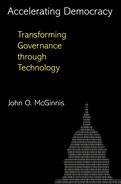THIS BOOK HAS ARGUED THAT politics can be improved by using information technology to prompt more minds to evaluate the consequences of policy. The book itself has been improved by the many minds that have probed and refined its arguments.
The Searle Center of Northwestern University convened a roundtable in September 2011 to discuss an earlier draft of the book. Participants were Robert Bennett, Tonja Jacobi, Andrew Koppelman, Jim Lindgren, Jide Nzelibe, Max Schanzenbach, and Jim Pfander, all of Northwestern Law School; Jamie Druckman of the Political Science Department at Northwestern University; Brian Fitzpatrick of Vanderbilt Law School; James Grimmelman of New York Law School; Robin Hanson of the Economics Department of George Mason University; Nelson Lund of George Mason Law School; Michael Rappaport of San Diego Law School; Brad Smith of Capital Law School; and Berin Szoka of TechFreedom. I owe them all a debt for vigorous debate over the ideas offered here.
I am also grateful to five friends—Andrew Clark, Steve Lubet, Mark Movsesian, John Pfaff, and Walter Stahr—who read portions of the manuscript and provided me with invaluable feedback. Conversations with Stephen Altschul, Sonia Arrison, Steve Calabresi, Ryan Calo, Seth Chandler, John Duffy, Neal Devins, Dan Hunter, Gary Marchant, Gillian Metzger, Paul Schwartz, Larry Solum, and Ilya Somin invigorated the project. I profited from presentations of my ideas at the Law, Science, and Innovation Center at Arizona State University; the University of Houston Law School; the Marquette Law School; the Singularity University; Stanford Law School; and the William and Mary Law School. Some years ago Michael Abramowicz taught a course with me on law and accelerating technology—appropriately by video link—and I learned a great deal from our exchanges. His book, Predictocracy: Market Mechanisms for Public and Private Decision Making, along with Ray Kurzweil’s The Singularity Is Near: When Humans Transcend Biology, provided an important catalyst for the ideas developed here.
Essays related to this work have been published as “Age of Empirical,” Policy Review 137(2006): 61; “Laws for Learning in an Age of Acceleration,” William and Mary Law Review 53 (2011): 305; “A Politics of Knowledge,” National Affairs (Winter 2012); and “Accelerating Regulatory Review,” in The Nanotechnology Challenge: Creating Legal Institutions for Uncertain Risks (Cambridge University Press, 2012). I am grateful to the editors for their suggestions, particularly Yuval Levin of National Affairs.
This book would never have been written but for Chuck Myers of Princeton University Press. Four years ago he came by my office to talk about possible book ideas and encouraged me to pursue this one. Without his intervention, I might have remained content to write articles. He has since provided a sympathetic sounding board for a neophyte book author. And without the introduction of Lee Epstein, a source of encouragement for the enterprise, I would never have met Chuck. My thanks also to Ann Adelman and Jill R. Hughes, excellent and sympathetic copyeditors. And I have been fortunate in hard working research assistants: Jonathan Bringewatt, Noah Brozinsky, Claire Hoffman, Branden Stein, Joshua Steinman, and Matthew Underwood.
My greatest debts are to my parents and to my wife, Ardith Spence. From the very beginning my parents gave me the confidence to try out bold ideas without fear of failure. Ardith’s thoughtful suggestions given with loving support have resulted in numerous improvements to the book. In preparing a book about how we need to adapt to world that is rapidly transforming, their essential contributions reminded me of the unchanging value of enduring virtues.
